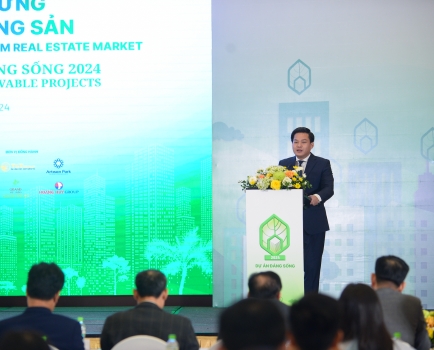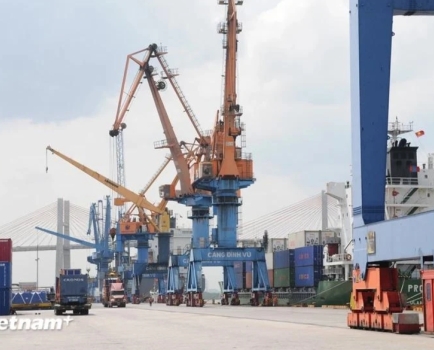To erase "carbon footprint" within the value chain
Tue, 14 Nov 2023 22:47:00 | Print | Email Share:
Sustainable development has evolved into an inevitable trend. Businesses that harness opportunities from climate change are bound to adopt new economic and financial models, engage in the carbon market, and cultivate environmentally friendly and sustainable business practices in line with market trends. Mr. Nguyen Sy Linh (pictured), The Institute of Strategy and Policy on Natural Resources and Environment (Ministry of Natural Resources and Environment), sheds light on the factors enabling businesses to undergo the most suitable and effective transitions.
 |
|
Mr. Nguyen Sy Linh. |
Could you please elaborate on how current international commitments related to climate change are affecting Vietnam?
International commitments linked to climate change, once solely addressing climate-related issues, now include economic development. Vietnam, in particular, heavily relies on extensive exports, encompassing a diverse range of export goods. Consequently, international commitments such as achieving zero net emissions, reducing global methane emissions, or commitments associated with curbing deforestation, especially in tropical forests, will impact Vietnamese businesses, particularly those involved in production and exports.
For instance, the European Union's cross-border carbon adjustment mechanism (CBAM) initially targets five carbon-adjusted products subject to carbon taxation. Businesses desiring to participate in the carbon market for exports must implement measures for greenhouse gas emission assessment and transition toward low-emission or low-carbon production to meet the requirements set by importing markets, specifically the European market and certain other countries. It is evident that international commitments related to climate change are affecting businesses in general, with a more pronounced impact on Vietnamese businesses, as the economy is geared towards exports.
In response to this context, the government has introduced significant policies, including the commitment to achieving zero net emissions at COP 26, followed by the National Climate Change Strategy for the period leading up to 2050. However, these solutions are nationally oriented, and it is essential to communicate and disseminate information to businesses. Businesses need to understand that climate change poses challenges but also offers opportunities.
In your opinion, how will businesses benefit from taking resolute and audacious steps to address climate change and reduce emissions toward achieving "Net Zero" in the current scenario?
Addressing climate change entails two facets: firstly, adapting to the impacts of climate change, particularly extreme weather conditions; secondly, reducing greenhouse gas emissions.
In the first aspect, when dealing with heat waves or extreme weather conditions, businesses' investments in adjusting production plans and infrastructure to adapt to climate change's effects are crucial. This helps businesses gain a competitive edge and, most importantly, maintain production activities without disruption.
Concerning the reduction of greenhouse gas emissions, in addition to domestic regulations such as greenhouse gas inventory and the implementation of measures to reduce greenhouse gas emissions, businesses also need to comply with international regulations. However, this transition takes time and effort. Nevertheless, for businesses that invest in adapting to the adverse effects of climate change and meeting market requirements, especially those related to reducing carbon footprints and greenhouse gas emissions, these efforts will create opportunities, aligning with global trends.
During the period to meet climate change adaptation requirements, Vietnamese businesses should chart a course and an approach to leverage opportunities stemming from climate change adaptation.
For each type of business, specific priorities and requirements should be identified, rather than applying a one-size-fits-all approach. For instance, energy-intensive manufacturing businesses should transition towards energy-efficient and renewable energy sources to reduce their carbon footprint. As for export-oriented businesses, reducing the carbon footprint can serve as a passport or certification to access international markets, especially those that demand emission calculations and carbon footprints for each product.
Businesses involved in agricultural supply chains, especially in rice, coffee, and cocoa, need to update themselves on market requirements and assess whether their production activities and raw material regions may be affected by deforestation. This ensures that product and raw material information meets the requirements and demands of international markets.
Hence, different climate change adaptation strategies are needed for different types of businesses, scales and locations of operation to ensure compliance with both domestic and international regulations while sustaining production and business activities.
In your view, what additional support is required to empower businesses to take bold and effective actions to address climate change and seize opportunities arising from these actions?
During this phase, the government and regulatory bodies should provide support to businesses. Firstly, they should regularly offer and update information, especially regarding global mechanisms and policies affecting business operations and adjustments linked to climate change. The state should assist businesses, especially during the initial stages of implementing mandatory regulations for greenhouse gas inventory and emission reduction measures. Additionally, incentives should be introduced to encourage the adoption of low-carbon or low-emission economic development models. Introducing such incentives and supporting the application of low-carbon or emission-reducing production and business models will stimulate innovation, especially in scientific and technological research aimed at emission-reduction goals and adapting to climate change impacts.
Particularly, currently, to support businesses, incentives should be provided for goods or services produced using low-carbon or low-emission methods.
Thank you!
By: Business Forum Magazine
Source: https://en.diendandoanhnghiep.vn/to-erase-quot-carbon-footprintquot-within-the-value-chain-n38701.html
---------------------------------------------
Same category News :













